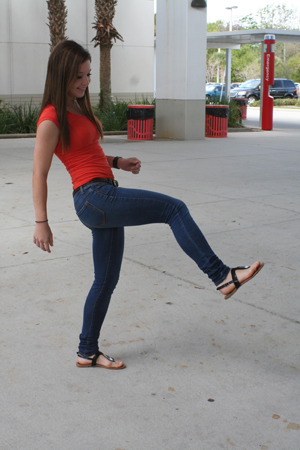
By MOLLY WALLACE
With over 50 independent nations, Europe offers a culture of it’s own. From their seas to the United States’ seas, Europe provides different foods, music and fashion, linking one country to the other. The differences, though, are plentiful for kids living in America with a European background.
Junior Dimitri Tsirigotis’ family is Greek; his father previously lived in Greece and his grandparents still reside in Sparta allowing him to visit his grandparent’s house, and a different culture, periodically.
“I go there four times a year,” Tsirigotis said. “It’s really mountainous there. They are more free there and a lot more laid back.”
According to Tsirigotis, Greece provides a more plentiful landscape, filled with farmland but less police and governmental institutions that one might see in America. The time it takes, due to its mountainous landscape, to travel from city to city is consuming.
The education system is more laid back in Greece, Tsirigotis claims; there is a greater focus on well-rounded minds, indulging kids in art or music classes. He also states that America is far more modern, with easily accessible computers and television.
According to Tsirigotis, the “Greek God” myths are not as stressed in the country as some might stereotype. And Tsirigotis claims that those living in Greece are not all good looking, like some might think, but they are purely Greek.
“There’s only one race there. Everybody is Greek,” Tsirigotis said. “A person who isn’t Greek sticks out like a sore thumb.”
Although the government recently insisted on a $172 billion bailout and the economy is in bad condition, the traditions are strong. For example, those living in Greece, and also Tsirigotis’ family in America, still perform certain customs on holidays. Due to a tradition of eating lamb on Easter, Tsirigotis’ family celebrates something Greeks have done for years.
“On Easter we kill a lamb and cook it in our yard, and after we season it. Some people might think it’s weird, but it’s tradition,” Tsirigotis said.
Another Greek custom is spitting on each other to spur the devil away after dinner, commonly done by Greek children. Tsirigotis and his family, whilst living in America no longer practice this, but customs such as these and food like pita bread, gyros, oregano and souvlaki (similar to a shish kabob), keep the Greek way of life going and the family bonding.
“The family is so much more together. We always know what’s going on,” Tsirigotis said. “Have you ever seen Big Fat Greek Wedding? It’s kind of like that.”
In another aspect, students like senior Marilyn Roy, offer an interesting cultural taste, but claim to be more Americanized. Roy’s family is from Germany; her grandpa moved the family to America after his years as a Nazi official.
“My grandpa was forced to be a Nazi soldier, although he tells me all the time he didn’t want to,” Roy said. “It was just part of the country’s doings at the time.”
All of Roy’s family lives in America now, but they still enjoy certain German ideas. Roy has been to big family gatherings celebrating Oktoberfest, when she was in elementary school, which relive the marriage of Prince Ludwig and Princess Therese von Sachsen-Hildburghausen, but in the past few years, her family has not celebrated this. Things such as the food they eat, like shweinshaxe (a chunk of pork served with fried potatoes) and the holiday traditions they experience with family, like a family game of croquet on Easter and Christmas, are still practiced.
“Things like Christmas trees and gingerbread house making came from Germany, and of course we do that,” Roy said. “My grandpa, Leslie Doll, loves making gingerbread with all of us around Christmas time.”
Roy has been influenced significantly by Europe’s positive views on outside activity and their willingness to engage in activities regularly, like soccer.
“I like the athletics in Germany. They care a lot about being outside and my parents and grandpa have influenced me on that,” Roy said.
Roy describes the attitudes on food. People and landscape as one would describe Texas: “Everything is bigger in Texas.” The food, especially pork and potatoes, a common food for Roy, is served in huge portions. In photographs her grandfather has shown her, she claims to see plenty of big mountains and hefty people.
Pictures of her family and grandpa in Germany provide her with some knowledge of the landscape, government institutions and education, but her first visit will be this summer, where she can get a full taste of her family’s past.
Both Tsirigotis and Roy claim that America has provided them with a more modern, and beneficial way of life. Neither feels deprived because of their European culture, but use it as a way to keep traditions flowing from one country to another.
//